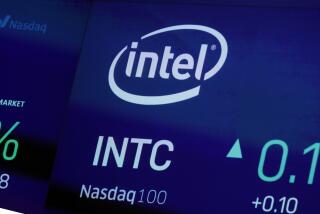Texas Instruments Net Off 88%; Layoffs Slated
- Share via
DALLAS — Texas Instruments, hurt by slumps in the semiconductor and energy industries, on Thursday posted an 88.6% decline in first-quarter profit and said it will have to lay off 1,000 more workers.
The electronics giant’s earnings plummeted to $9.1 million in the first three months of this year from $79.8 million a year ago, company President J. Fred Bucy told shareholders at the firm’s annual meeting. Revenue was $1.29 billion, down 4% from $1.34 billion.
“The pressures on TI’s profits will continue and may intensify in the near term,” Bucy said.
Another 1,000 jobs will be cut in the second quarter to help hold costs down, he said, but company officials said they haven’t determined where those cuts will occur.
Bucy also warned that shortened workweek schedules in the semiconductor division will be extended through the second quarter.
Texas Instruments, which employs more than 83,000 people worldwide, announced a 2,000-job reduction last December, about 1,300 of those in Texas, according to spokesman Norman Neureiter.
Gloomy Industry Forecast
Bucy also offered shareholders a forecast for the semiconductor industry that was even gloomier than the 10%-to-12% sales dip that some analysts have predicted.
“The world semiconductor market in 1985 will be down 15% from 1984 to $22 billion,” he said. “We believe the impact that the weakness in the computer market will have on future semiconductor demand has not been fully recognized.”
He attributed the company’s quarterly earnings drop to the continuing world oil glut, start-up costs for new plants in Dallas and Japan and a semiconductor industry that has grossly oversupplied the market.
Bucy said, however, that “we are continuing high levels of investment in research and development of new products and processes. Although this investment depresses near-term profits, it’s the right decision for the long-term future of the company.”
Demand for semiconductors, the tiny “chips” that are the major building blocks of computers and one of the company’s major businesses, has been soft throughout the industry.
“No one predicted the severity of the semiconductor downturn” in an industry that grew 46% in 1983-84, Bucy said.
Targeting Special Markets
Neureiter said it took Texas Instruments three months to resolve a semiconductor testing problem that the company notified the Pentagon about several months ago. No equipment failure was ever found, he said, and the company considers the matter cleared.
The Defense Department stopped accepting Texas Instruments chips after the company found irregularities in its testing program.
After taking a financial beating in the personal-computer market, Texas Instruments scrambled out of it and is now concentrating on more specialized business and professional markets, Bucy said.
Bucy added that Texas Instruments also expects its government contracts business to be flat this year and said demand for geophysical products “is weak because of the continued oil glut.”
More to Read
Inside the business of entertainment
The Wide Shot brings you news, analysis and insights on everything from streaming wars to production — and what it all means for the future.
You may occasionally receive promotional content from the Los Angeles Times.










